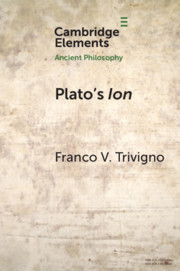Plato's Ion
Poetry, Expertise, and Inspiration
Published online by Cambridge University Press:
05 October 2020
- Franco V. Trivigno
- Affiliation:
Universitetet i Oslo
Summary
This Element defends an interpretation of Plato's Ion on which its primary concern is with audience reception of poetry. The dialogue countenances and rejects two models of poetic reception, the expertise model and the inspiration model, both of which make the audience entirely passive in relation to poetry; and it presents the character of Ion as a comedic figure, a self-ignorant fool whose foolishness is a function of his passive relation to Homer. In the end, this Element argues that, for Plato, critical engagement is the proper way for audiences to treat poetry. This view holds open the possibility that poetry may express some truths without thereby endorsing the idea that poets are experts who have authoritative knowledge.

